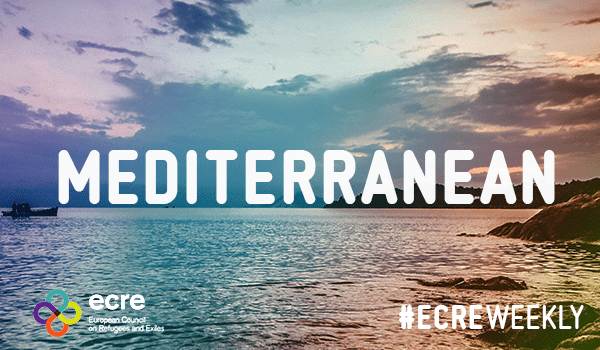Civilian search and rescue operators are saving hundreds of lives at sea, in the face of intimidation tactics from the so-called Libyan coast guard. The European Commissioner confirms EU commitments to border management cooperation with Libya, as the International Criminal Court (ICC) receives a new communication on Libyan crimes against humanity taking place with EU complicity.
186 survivors onboard the Geo Barents rescue vessel, operated by Médecins sans frontières (MSF Sea) disembarked in Messina, Sicily, on 20 November. Ten people who were found dead on the boat after the rescue operation on 16 November can now, according to the organisation, “have a dignified burial”. The Sea-Watch 4, operated by German NGO Sea-Watch, is requesting a safe port for more than 400 people, including pregnant women and children, rescued on the central Mediterranean in several operations between 18 and 22 November. On 26 November the organisation stated that Sea-Watch 4 was authorised to take shelter in front of the port of Augusta, Sicily with bad weather putting the survivors onboard at risk of hypothermia – four people have lost consciousness and are being assisted by the medical team. The organisation’s Seabird plane also spotted a boat of 40 people adrift in Maltese waters on 22 November and urged authorities to coordinate a rescue. The same day, the NGO hotline Alarm Phone lost contact with 90 people including four pregnant women and 17 children in distress in the Maltese SAR zone. Authorities refuse to reveal information about their fate. Meanwhile, the intimidation of civilian search and rescue operators by the so-called Libyan Coast Guard continues. Sea-Watch recently released audio documenting threats made to the crew of the Sea-Watch 4 in international waters by a Libyan patrol boat. During a rescue operation on 20 November the crew on Sea-Watch 4 managed to bring aboard six survivors who jumped in the ocean after being intercepted by a Libyan patrol boat and swam to safety. During the incident, the Libyan patrol boat “dangerously approached the Sea Watch 4”. On 17 November a shipwreck off Libya claimed at least 75 lives, while 15 people were saved by local fishermen. According to the international Organization for Migration (IOM) 1,236 men, women and children have died or gone missing on the central Mediterranean in 2021 as of 20 November.
On 22 November, European Commissioner for Home Affairs Ylva Johansson described her meeting with vice president of the Presidential Council of Libya, Moussa al-Koni, as “open” and “constructive”. The commissioner confirmed EU commitments to support Libya in “managing” its borders, also noting that: “Migration should be managed jointly along the routes, including that of the Sahel”. The statements came just one day before a communication was filed to the International Criminal Court (ICC) on grave crimes committed against migrants and refugees in Libya which may amount to crimes against humanity. The communication was filed by the European Center for Constitutional and Human Rights (ECCHR), the International Federation for Human Rights (FIDH) and Lawyers for Justice in Libya (LFJL), in collaboration with survivors. The submission “names 19 alleged Libyan perpetrators including well-known militia chiefs”, and the organisations urges the ICC “to hold those responsible to account and put an end to these widespread and systematic crimes”. The accompanying report states that, in Libya: “migrants and refugees [have] experienced some of the worst atrocities at the hands of state and non-state actors alike. This report argues, firstly, that these atrocities may amount to crimes against humanity and, as such, should be investigated and prosecuted by the [ICC]. Secondly, it questions the role of the [EU] and its member states in facilitating these crimes […] the EU and its member states have implemented a series of radical measures to contain migrants and refugees in Libya, despite being fully aware of the crimes committed against them in the country. In cases where migrants and refugees do manage to escape to the Mediterranean Sea, policies have been put in place to ensure that migrants and refugees are returned to Libya”. 30,104 people have been intercepted and returned to Libya by the so-called Libyan Coast Guard supported by the EU in 2021 so far. Most are then detained in an indefinite and arbitrary manner in detention centres. In October, thousands were subjected to violence in a violent crack-down by Libyan authorities. The UN Refugee Agency (UNHCR) this week announced the agency had facilitated the release of 58 asylum seekers from Ain Zara and Trik-Al-Sikka detention centres, most of whom were arrested in the October crackdown.
For further information:
- ECRE, Med: Cyprus Seeks Commission Approval of Asylum Procedure Suspension, Arrivals to Italy Continue, Deaths and Interceptions by Libya, November 2021
- ECRE, Med: Sea-Eye 4 Allowed to Disembark, 250 Survivors Wait Onboard the Ocean Viking, More Returns to Unsafe Libya, Italy Provides Safety for Syrians and Afghans, November 2021
Photo: ECRE
This article appeared in the ECRE Weekly Bulletin. You can subscribe to the Weekly Bulletin here.

